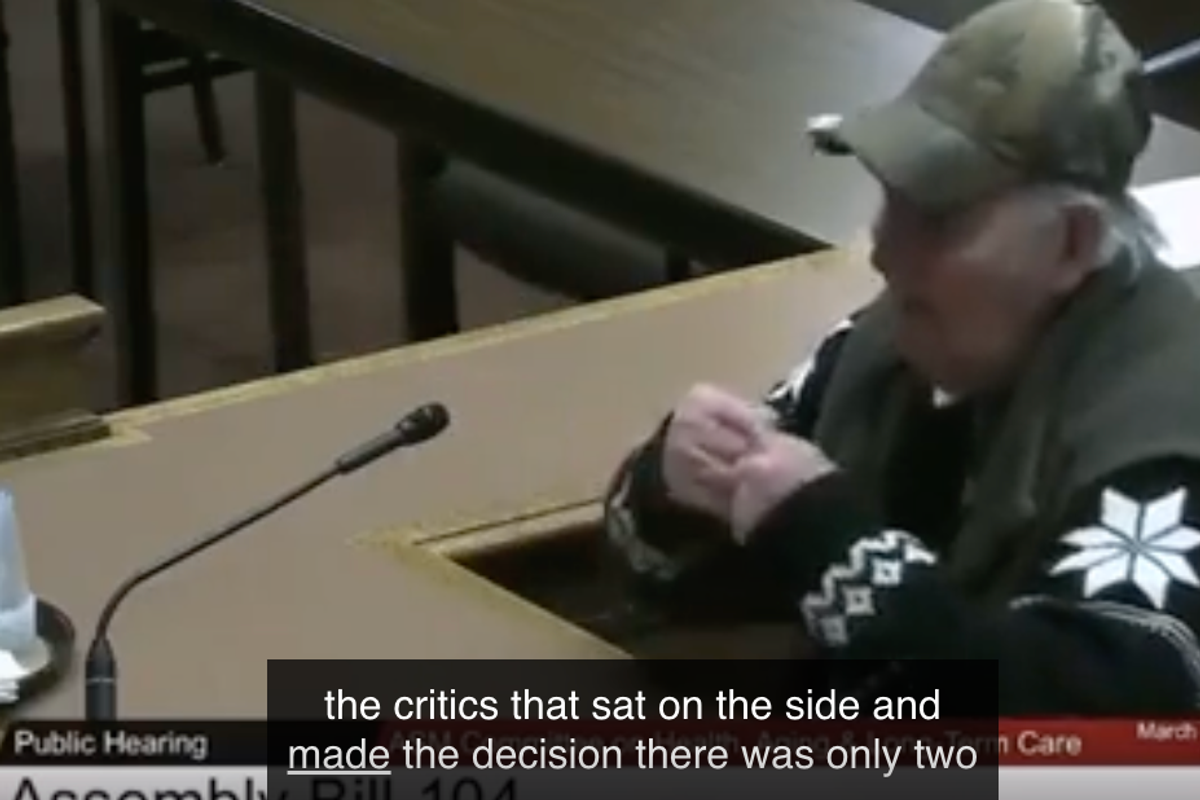Elderly Wisconsin man shows up to support anti-trans bill and ends up apologizing instead
“When I came here my eyes were opened.”
Elderly Wisconsin man supporting anti-trans bill apologizes
There have been a lot of anti-trans bills being presented on the state and federal levels in recent years. Many of the bills are being presented as a way to protect girls and women from trans people in sports and public restrooms. The proposed legislative changes often play off the fear of the unknown and heighten the perceived risk to biological females.
The ongoing politicization of gender has resulted in a major shift in public sentiment. Recent research from Pew shows that support for transgender protections has dropped 8 points since 2022, with an equal 8 percent rise in the number of Americans who believe there should be laws that require athletes to compete on teams that match their sex at birth (88 percent).
Yet when one elderly man in Wisconsin fell into that way of thinking, he did something seemingly extraordinary in today's political climate. He listened. The elderly man named Larry was asked to speak in support of Assembly Bill 104 (AB104) at the Wisconsin State Legislature, but while he patiently waits his turn, something begins to change.

AB104 is written to prohibit medical intervention for gender transition for people under the age of 18. Medical gender transition services for children typically involve puberty blockers once a child reaches the age where puberty is imminent. According to the Human Rights Campaign, hormone treatment is often reserved for late teens and those over the age of 18 with nothing medically irreversible being completed until after the age of 18. Puberty blockers and hormone replacement require parental consent as well as a consensus from the child's medical doctor and gender therapist.
Larry sat waiting to speak for seven hours before it was his turn and by the time he spoke he admittedly changed his stance. Not only did he change his stance, Larry did so publicly and proceeded to apologize for his ignorance on the topic before hearing the testimony of trans people.

“First of all, I’d like to apologize to you people, I was invited here to give my support for bill 104. I have a very little knowledge of gay people and things like that there, Larry says while speaking to lawmakers. So when I came here, my eyes were opened. I was one of the critics that sat on the side and made the decision there was only two genders, so I got an education that was unbelievable."
Larry wasn't done, he wanted to let people know the testimonies changed his views, "and I don’t know just exactly how to say this but my perspective for people have changed. So I don’t want to take up no more of your time. I’d like to apologize for being here and I learned a very lot about this group of people."
The man's willingness to still get up to speak knowing his opinion had changed is an excellent example of how you can change your mind after receiving new information.
Larry did something that many people hope others will do while having a discussion by listening to another perspective with an open mind and being willing to change your perspective when new information is presented.
His one minute speech went viral on social media platforms like Reddit and TikTok with people praising the man's willingness to publicly change his opinion.
"To be an elderly person like this, and able to listen to new information from people with firsthand knowledge, while simultaneously developing thoughts and opinions based on that to grow, is amazing to see in real time. Bless him," one person shared.
"Legit renews my faith in humanity. There are times when I think this type of thoughtful reflection and changing of political viewpoints isn't possible, so it is really nice to see," another says.
An old man who was going to speak against gender-affirming care in the Wisconsin state legislature, changes stance after listening to testimony for 7 hours.
byu/RoyalChris inMadeMeSmile
"Real man, right there. Willing to admit his mistakes, and not dig his heels in any further once he sees truth. Keep learning and evolving, father," someone else writes.
"We need to teach humility to our kids and to each other. That power to recognize when you´re wrong? It's humility. Society at large tends to view humility as being meek or weak, but it's actually the exact opposite. The appreciation that this guy is getting in the comments is because we recognize the strength of his character. It requires courage to change viewpoints and even more courage to do it publicly. Humility is about knowing that you could be wrong and seek information that may be against what you believe, and, if you find it, change your mind. A strong mind changes their opinion quickly in the face of evidence. 'Strong opinions, loosely held,'" one person adds.
Unfortunately, the debate of gender isn't going away anytime soon. It's one of the most divisive topics in American public life even though it's one that impacts an incredibly small percentage of people. Regardless of where one falls on the issue, Larry's willingness to listen, learn and change his mind is one that all Americans would do well to follow. If we all genuinely want what's best for people, having an open mind and an open heart might be the change that will finally let our leaders focus on solutions over division.
- Utah Republican risks political career by speaking out against party's transgender sports bill ›
- 10-year-old trans girl brilliantly calls out Texas lawmakers for attacking her since 'pre-K' ›
- ‘Genital verification’? Funny troll mocks anti-trans bathroom laws with Dallas airport signs. ›
- Texas dad and son meet a trans woman for the first time, and dad sets a wonderful example - Upworthy ›

